Ivor Abadi, founder of The Twisted Wheel, talks about the Manchester club’s role in the birth of the British mod culture and the northern soul music-and-dance movement during the 1960s. Memorabilia from the club and information about its history can be found at thetwistedwheel.com.
Northern soul is basically American soul music that became the popular soul music of Northern England. The Twisted Wheel opened in 1963 in Manchester, and what might be termed “soul music” probably started to come around about the same time. It wasn’t actually called northern soul in the early ’60s, but that’s really the start of it.
The inspiration for the club was that young people needed a place to meet, listen to music, and dance. There were coffee bars in England at that time where people would meet, and they had music but no dancing. So we called our place a coffee dance club because there was no alcohol. We predominantly attracted a young crowd, say 16 to 22, though some were as old as 30.
We were five brothers. My older brother Jack came back to England in ’62 after being in the States and the Philippines. We found a place in the center of Manchester and decided on wheels as the theme. That involved collecting all kinds of wheels—from cartwheels to bicycle wheels. We even had a ship’s wheel from Paris. That formed the club’s décor. It was just brick walls painted black, white, and red in a basement, with lots of little, cavernous rooms. It really had a character all its own.
We had two distinct sessions at the club: the ordinary session—four nights a week on Tuesday, Thursday, Friday and Saturday, when it would be open from 7:30 p.m. until midnight—and then the all-night session on Saturday, which drew people from a much wider area. They’d come from 100 miles away. This is the scene that ultimately developed into what we now call northern soul.
“Northern soul music is typically fast and very danceable.”
I think we were at the right place at the right time when we opened because the Beatles had just started to hit. This was the baby-boom generation—people born in 1946, ’47. There were a lot of young people, and they wanted something different.
Musically, we started with jazz and blues, which slowly became rhythm and blues, which became soul music, and then, eventually, northern soul. We didn’t want to be as commercial as everybody else. So we were playing different music even in the early days. It wasn’t pop-based.
Collectors Weekly: Who coined the term northern soul?
Abadi: Dave Godin, the editor of “Blues and Soul” magazine in London, visited The Twisted Wheel and heard the soul music we were playing at an all-night session. He wrote an article in which I think he said, “This is northern soul.” In other words, it wasn’t what they were playing in the south of England.
In London they had a lot of jazz clubs, and even in the late ’60s they weren’t listening to the faster dance music that inspired the unconventional dancing at The Twisted Wheel. There were no other clubs at the time where people were dancing like this.
Collectors Weekly: Was the club popular right away?
Abadi: Absolutely. I knew we wanted to have nonstop music. I didn’t want interruptions from the DJs, who always wanted to talk. I wanted musical continuity. You have two turntables, and when one record is finishing, you blend it into the next one. We always wanted that. It was like magic, and we’re not quite sure how that happened, but it was a big hit from the very beginning.
The club’s first location was in the center of Manchester, where we stayed from January 1963 until September 1965. When the lease was up we moved across town and did business out of our second location from September ’65 until about January ’71.
Collectors Weekly: What were the other defining elements of northern soul besides music and dancing?
Abadi: I think the clothes. They were very smart and different. The girls used to wear duffle coats, which were very popular. And there was a period when they wore long gloves, which were very trendy and fashionable. The style of the people who came to the club was a bit exaggerated and unconventional.
They would also make their own badges uniting themselves to each other. We sell badges now as memorabilia, but we didn’t have them then. They would come in with bags and have a change of clothes and shoes because it was an all-night session. The people who came to the club created its atmosphere. I think our very friendly atmosphere and the dancing were the most important things to our customers.
Collectors Weekly: What sorts of collectible memorabilia from The Twisted Wheel are popular?
Abadi: The original membership cards are the most coveted. They’re available and not expensive. I still have a huge collection of different membership cards from the ’60s—they go for about 5 pounds each. Original leaflets and posters are also very collectible. We did have pens with the club name on the side, just cheap pens. Nowadays we’ve also got new memorabilia—T-shirts, key fobs, badges, a few other bits and pieces—but all the original wheels that decorated the club are certainly collector’s items.
Collectors Weekly: Can you describe a typical all-nighter?
Abadi: There would always be a queue outside because we’d have to empty the club from the early session. We’d let them in usually about midnight. They’d pay their money, take off their coats, and there’d be a coffee bar on the ground floor area. They’d meet up there, hoping to run into friends from all over the place, and they’d have a coffee. Then they’d take their bags to the clubroom, and maybe at that stage they might start exchanging records, which was a popular thing to do at the club.
We had three different rooms in those days, including two big rooms downstairs where records were playing. A live band would play in one area, but we’d have records playing in another. If the group was very popular, then we’d feed the sound all the way around the club.
The atmosphere was really charged, with lots of people dancing. We never had any flashing lights in the club. The lighting was situated behind the wheels, so some of the light came through bicycle spokes. It was all hidden lighting.
We were very strict about who we let into the club. We only wanted nice people. We never had any trouble, and the young people appreciated that. They came from all walks of life, and they all got on, which was strange. Usually people were cliquish and stuck to their own sort. But here they enjoyed something in common.
Collectors Weekly: And there was no alcohol, right?
Abadi: None at all. That was becoming very unusual as we got to the late ’60s. Other clubs that served could only stay open until 2:00 a.m. But we were able to stay open all night because we didn’t have alcohol.
When we first started doing all-night sessions, we used to close at about 3:00 or 4:00 in the morning. But because a lot of people came on public transport, they had nowhere to go until their public transport started again. So the local police came to us and asked us if we’d stay open a little later so that people weren’t wandering the streets. The police weren’t pleased that people were coming from other towns and cities.
We got blamed for everything that happened because we attracted all the people. And of course there was a little pep-pill scene in the ’60s—amphetamines—and obviously some of them took pills, but not everybody. We got blamed for something that was happening all over the place, including schools and universities. Suddenly the pep-pill scene was portrayed as something we’d created, but that’s another story.
Collectors Weekly: Who were some of the best-known northern soul DJs, and what did they play?
Abadi: Brian Rae was one, and he’s still playing northern soul music today. Roger Eagle worked with us, but he’s passed away. If anything, he was a little too way out. He was more interested in the purity of the music and was happy for everybody just to sit and listen. But that’s not what the crowd wanted, or what we wanted, for that matter. Brian Phillips was another great DJ. I don’t know where they all are today. Hopefully most of them are still alive.
The records they played came predominately from the States, in particular Chicago, New Orleans, and Detroit. They were imported by ship or plane. Of course these importers got to know us, and they sent records directly to the club, so we’d get all the new releases.
We also got a lot of records from the U.S. Air Force bases in England. There was one not too far away. The DJs used to communicate with airmen, and we would get the music they were playing, some of which became northern soul. Manchester also had Jamaican music shops. So we had this mix of Jamaican-style music, soul, and blues to produce a new overall sound.
Northern soul music is typically fast and very danceable. The dancing itself is also fast. The young people, especially the boys, would do acrobatic-type dancing, so they’d need a lot of space to do it. Sometimes one or two of the boys would take over the whole dance floor to the detriment of other people dancing. They wouldn’t quite be doing somersaults, but you’d see them spin around on the floor.
I think the popularity of the records depended more on the sound and the tune. As long as the beat was there and it was danceable, it didn’t really matter who the artist was. You could tell straight away if a song was a hit: You’d put on a record and watch the dance floor fill up, or vice versa.
Generally an artist would only have one popular northern soul record. There weren’t too many artists with two or three. A few examples off the top of my head—these are all American artists—are Bobby Sheen, who made a record called “Dr. Love.” The Invitations had “What’s Wrong With Me Baby.” Other popular tunes were “There’s Nothing Else to Say Baby” by The Incredibles and “A Lil Lovin’ Sometimes” by Alexander Patten. They were mainly Motown-based artists on the Tamla Motown label.
Collectors Weekly: Were the records 45s or LPs?
Abadi: Mostly 45s, the singles. But we had LPs for very popular artists, and we also played 10-inch records. We actually had our whole record collection stolen when we first opened at the second venue in 1965. We marked our records by punching a hole in the center label of the 45. When they were stolen, we knew they’d end up in other clubs. But even when we went down to the other clubs and found our records with the little hole punched in the middle, the police said, “It’s circumstantial. It doesn’t prove anything.”
Fortunately, we didn’t have to start from scratch because that’s when the DJs started to bring in their own records. Obviously we built our own collection alongside theirs.
Collectors Weekly: How big was The Twisted Wheel’s record collection?
Abadi: We had maybe 5,000 records prior to them being stolen. We probably bought 50 records a week, but if the records were widely available in the shops, then it wasn’t what we were looking for because our clientele was looking for something different. The artists we played were on labels like Groovesville out of Detroit. There were also New York labels like Scepter and Wand, all the major American labels (Capitol, ABC, Columbia), and obviously the Motown record labels.
Although it was U.S. soul music, the records were usually not that well known in the States. I think when we were importing records our suppliers didn’t realize the discs they were sending us were such hot properties in England. From our point of view, it was simply cheaper to import the records from the States than to buy them from retailers in the U.K.
We also played a lot of music that wouldn’t be considered northern soul, such as records by Ritchie Barrett, who did “Some Other Guy.” We played Chuck Berry, Bobby Bland, and Bo Diddley. His records were very popular, even though they were pure R&B, because the music was fairly fast. We played Booker T and the MGs, James Brown, Alvin Cash, the Castaways, the Toasters, Fats Domino, the Impressions, and Poison Ivy. “Shake” by Sam Cooke was a popular number.
There were a lot of popular English acts as well, including Cyril Davies’ R&B All Stars, the Spencer Davis Group, the Dominoes, the Kinks, and Betty Everett. There are so many: Doris Troy, Sugar Pie DeSanto, Sonny Boy Williamson, Gene Chandler, Chubby Checker. Arthur Conley’s popular song was “Sweet Soul Music,” Don Covay’s was “See-Saw.”
We brought over a lot of acts from the States for two- or three-week tours. Every Friday and Saturday night we’d have a group on. We had to have English groups because there weren’t always American groups around. Even though we opened in January of ’63, didn’t host any American groups until probably September or October when we started the all-night sessions.
Frequently, we’d book the bands we’d brought over into other clubs. We had Fontella Bass, Bob and Earl (their hit was “Harlem Shuffle”), Alvin Cash & the Crawlers.
The marvelous thing about the American groups as opposed to the early English groups is that when they performed live they all sounded exactly like their records. But three groups stood out by a mile: Jr. Walker and the All Stars, the original Drifters, and the Ike and Tina Turner revue, which had The Ikettes, who were absolutely fantastic on stage.
Collectors Weekly: Over the years, did your club remain popular?
Abadi: No question about it. We still captured they crowd even when new clubs started running competing all-night sessions. We had the atmosphere. I’m not saying that we weren’t affected from time to time, but by and large the people stayed with us. Toward ’69 or ’70 it got a little more difficult because we didn’t have an alcohol license and everyone else was getting them. Things perhaps waned slightly at the end, but we still had a very good following, and we were still bringing American groups over.
Collectors Weekly: Why did you close the club in 1971?
Abadi: It’s ironic. The police didn’t want us to have an alcohol license because they didn’t want us to have all-night sessions. They were worried about the potential mix of alcohol and pills, which was nonsense, really, because we probably would’ve ceased the all-night sessions if we’d been granted a license.
We got turned down every time we applied for a license. So we carried on with the all-night sessions, and they continued to be popular, much to the annoyance of the authorities.
Finally, in 1971 we got an alcohol license. We closed The Twisted Wheel and opened a new club on the same premises called Placemate 7, which was a completely different club with a different crowd. It was a commercial decision. By this time there were other clubs playing northern soul, although none were as popular as The Twisted Wheel. It was time to do something different. I suppose Wigan Casino became the club that took northern soul into the next dimension.
Collectors Weekly: Is the northern soul scene still going strong?
Abadi: It’s very big now. A lot of people have little northern-soul gatherings. Today, northern soul can be found almost anywhere in the U.K. It has stuck as a type of music.
(All images in this article courtesy of Soulbot.)





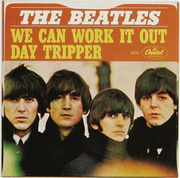
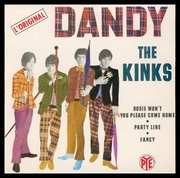 Stephen M. H. Braitman on the British Invasion, from the Beatles to the Sex Pistols
Stephen M. H. Braitman on the British Invasion, from the Beatles to the Sex Pistols
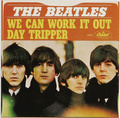 Beatles 45s To Make You Twist and Shout
Beatles 45s To Make You Twist and Shout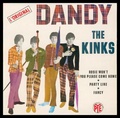 Stephen M. H. Braitman on the British Invasion, from the Beatles to the Sex Pistols
Stephen M. H. Braitman on the British Invasion, from the Beatles to the Sex Pistols Psych Out: The Trippy Side of Vintage Vinyl
Psych Out: The Trippy Side of Vintage Vinyl Northern Soul RecordsNorthern Soul does not refer to a music genre per se. Rather, it is the phr…
Northern Soul RecordsNorthern Soul does not refer to a music genre per se. Rather, it is the phr…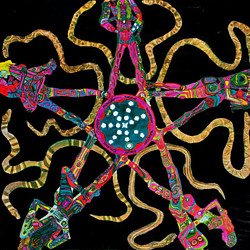 Mari Tepper: Laying it on the Line
Mari Tepper: Laying it on the Line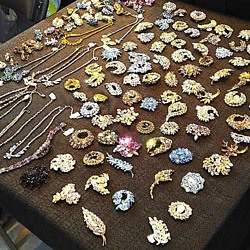 Nice Ice: Valerie Hammond on the Genteel Charm of Vintage Canadian Costume Jewelry
Nice Ice: Valerie Hammond on the Genteel Charm of Vintage Canadian Costume Jewelry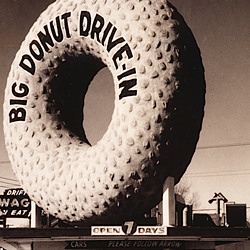 How Jim Heimann Got Crazy for California Architecture
How Jim Heimann Got Crazy for California Architecture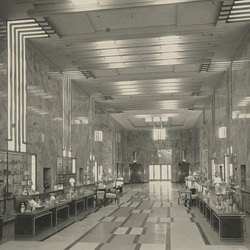 Modernist Man: Jock Peters May Be the Most Influential Architect You've Never Heard Of
Modernist Man: Jock Peters May Be the Most Influential Architect You've Never Heard Of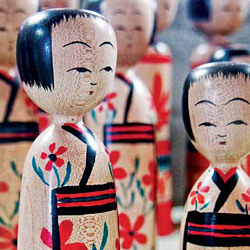 Meet Cute: Were Kokeshi Dolls the Models for Hello Kitty, Pokemon, and Be@rbrick?
Meet Cute: Were Kokeshi Dolls the Models for Hello Kitty, Pokemon, and Be@rbrick?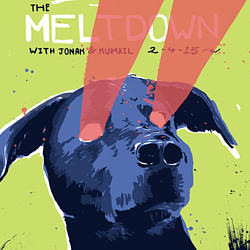 When the King of Comedy Posters Set His Surreal Sights on the World of Rock 'n' Roll
When the King of Comedy Posters Set His Surreal Sights on the World of Rock 'n' Roll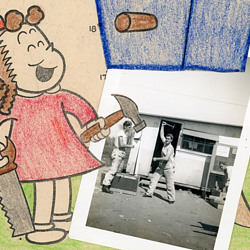 How One Artist Makes New Art From Old Coloring Books and Found Photos
How One Artist Makes New Art From Old Coloring Books and Found Photos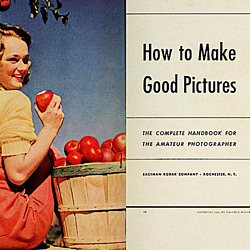 Say Cheese! How Bad Photography Has Changed Our Definition of Good Pictures
Say Cheese! How Bad Photography Has Changed Our Definition of Good Pictures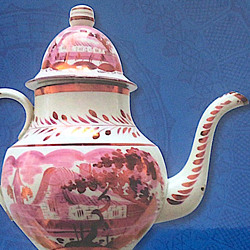 Middle Earthenware: One Family's Quest to Reclaim Its Place in British Pottery History
Middle Earthenware: One Family's Quest to Reclaim Its Place in British Pottery History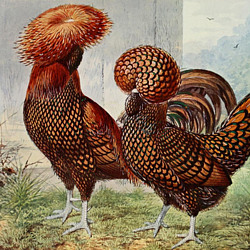 Fancy Fowl: How an Evil Sea Captain and a Beloved Queen Made the World Crave KFC
Fancy Fowl: How an Evil Sea Captain and a Beloved Queen Made the World Crave KFC
I think this interview was a little clouded on some issues. The Twisted Wheel reopened about 10 years ago and the ‘little gatherings’ he speaks about are really large gatherings. They still play the original music at the present Wheel and its in the same building on Whitworth Street as it used to be in the 60’s.
The term ‘Northern Soul’ is not used at The Wheel, this tends to be used about ‘The Wigan’ era in the 70’s. The diving all over the floor type of dancing was not done.
i agree with maureen twisted wheel is the birth place of northern soul great djs like brian rae who still dj to this day sunday sessions at wheel are well lets say ive never seen such a great crowd of people great music ivor was there at the start but look were wheel is today biger than ever i only wish i was born to go 1st time around
i remember the special bank holidays at the wheel and actually helping out on the door ! fantastic memories of fabulous music and friends and characters of the scene x
I realy enjoyed the article, and I also think his opinion of the dancing, if he’s talking 1970-71 is pretty close to the mark.
“The young people, especially the boys, would do acrobatic-type dancing, so they’d need a lot of space to do it. Sometimes one or two of the boys would take over the whole dance floor to the detriment of other people dancing. They wouldn’t quite be doing somersaults, but you’d see them spin around on the floor.”
Frank “Booper” New dancing to Alexander Patten – absolutely awesome.
Wonderful, wonderful memories.
David
All the best Ivor.Hope you are keeping well.
Regards,
Alan Williamson
There are two books about the Twisted Wheel – CENtral 1179 which is itself a collectors item, and another one which is becoming a collectors item: The MANCHESTER WHEELERS, which does tell the real story of the ‘Wheel’the drugs and the record collecting and the Mod scene at The Twisted Wheel.
The best book so far about collecting Northern Soul 45’s is The Northern Soul Top 500 by Kev Roberts. A forthcoming book is the Top 500 Manchester Soul records – the genesis of the music that started off this phenomenon of Northern Soul mostly as played by Roger Eagle.
Hi everyone,
I like all your comments, and welcome as many as possible.
Have you joined our website yet?
thetwistedwheel.com
You can chat on the forum, and have a look at memoribilia available.
I need any stories for forthcoming book on The Twisted Wheel.
Keep them coming,
Regards,
Ivor Abadi.
was way too young to attend the original wheel but have to take my hat off to the founders of this great music we have all grown to love and will cherish till the day we die
flanny
My longest , lasting memory was seeing Rufus Thomas performing the Do the Funky Chicken in the “stage room “, on the left hand side as you walked down the stairs. It was Saturday 23rd January 1971 ( didnt know it then but only 2 weeks before the Wheel closed ) , the place was packed and it is was raining outside – you could tell it was raining as the rain was running down the walls on the inside of the club ! Rufus was in top form dressed in red hot pants and knee length white boots dancing to The funky chicken – that surreal memory has stayed with me down the decades. Great venue, lasting memories. Saw plenty of bands, didnt realise the influence they would have on me at the time. Also in Manchester used Pendulum , Top of the Town, as well as Top Twenty , The Birdcage , Casino , The Moon in Dukinfield.
My mates and I used to travel by train from Oldham and we used to put our return train tickets down our socks because at that time it was a regular thing to get ‘ rolled ‘. At least we had our tickets to get home the next morning !
THE TWISTED WHEEL
Happy memories with Ivor, Jack and Victor. I think of you all often.
Hope you are well Ivor.
Loved the history.
Sylvia
Cheers Iver, went to the wheel fom the beggining to the end and loved every minute of it. So many classic bands as you say the original Drifters brilliant, Jnr Walker etc etc. Never any trouble, had to have some pills to dance all night, but very harmless. We dressed very smart dancing was great. Best time of my life Ivor thanks to your family and the great people you attracted.
Just returned to the uk spent many great nights at the old and the new wheel rgds to the gang I used to hang with and to dj Joe Makin and t who was a great mate all the best to Ivor as well.
I used to work at the Twisted Wheel in 1963 when first opened. In the office from 11.00 until 2.00 then helped in the coffee bar. Met some of the stars and was with Jack and Ivor. One of my memories was painting the cloakroom with Ivor. Often wonder where they are now. I am a 77year old now but little did I realise I would be part of such local musical history. Any information would be great….thanks
Hi Veronica. My late wife Winifride (nee Evans) worked at the Twisted Wheel from 1963 – 1965. Her sisters Christine and Cathie also worlked there. they worked the all nighters and worked in the cloakroom and possibly in the coffee bar. She told me how good the Abadi brothers were and that Ivor always took them home. Any memories you have of the Brazenose Venue I would be very grateful for.
Martin Logan